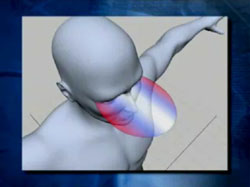ScienceDaily (Sep. 30, 2008) — For years, physicists have been heralding the revolutionary potential of using quantum mechanics to build a new generation of supercomputers, unbreakable codes, and ultra-fast and secure communication networks.
See also:
The brave new world of quantum technology may be a big step closer to reality thanks to a team of University of Calgary researchers that has come up with a unique new way of testing quantum devices to determine their function and accuracy. Their breakthrough is reported in Science Express, the advanced online publication of the journal Science.
"Building quantum machines is difficult because they are very complex, therefore the testing you need to do is also very complex," said Barry Sanders, director of the U of C's Institute for Quantum Information Science and a co-author of the paper. "We broke a bunch of taboos with this work because we have come up with an entirely new way of testing that is relatively simple and doesn't require a lot of large and expensive diagnostic equipment."
Similar to any electronic or mechanical device, building a quantum machine requires a thorough understanding of how each part operates and interacts with other parts if the finished product is going to work properly. In the quantum realm, scientists have been struggling to find ways to accurately determine the properties of individual components as they work towards creating useful quantum systems. The U of C team has come up with a highly-accurate method for analyzing quantum optical processes using standard optical techniques involving lasers and lenses.
"It is a completely different approach to quantum characterization than we have seen before," said post-doctoral researcher Mirko Lobino, the paper's lead author. "This process will be able to tell us if something is working correctly and will hopefully lead the way towards a quantum certification process as we move from quantum science to making quantum technology."
The development of quantum computers is considered the next major advancement in computer processing and memory power but is still in its infancy. Unlike regular silicon-based computers that transmit information in binary units (bits) using 1 and 0, quantum computers use the subatomic physical processes of quantum mechanics to transmit information in quantum bits (qubits) that can exist in more than two states. Computers based on quantum physics are predicted to be far more powerful than computers based on classical physics and could break many of the most advanced codes currently used to secure digital information. Quantum physics is also being used to try and create new, unbreakable encryption systems.
The same research group at the U of C, led by physics professor Alexander Lvovsky, made headlines earlier this year when they were one of two teams to independently prove it's possible to store a special kind of light, called a "squeezed vacuum." That work is considered the initial step towards creating memory systems for quantum computing.
Based in the Faculty of Science, the Institute for Quantum Information Science is a multidisciplinary group of researchers from computer science, mathematics and physics who are conducting leading research in key theoretical and experimental topics of quantum information science.
Journal reference:
- Mirko Lobino, Dmitry Korystov, Connor Kupchak, Eden Figueroa, Barry C. Sanders and Alexander I. Lvovsky. Complete Characterization of Quantum-Optical Processes. Science, September 25, 2008
 Loading Image...
Loading Image...


